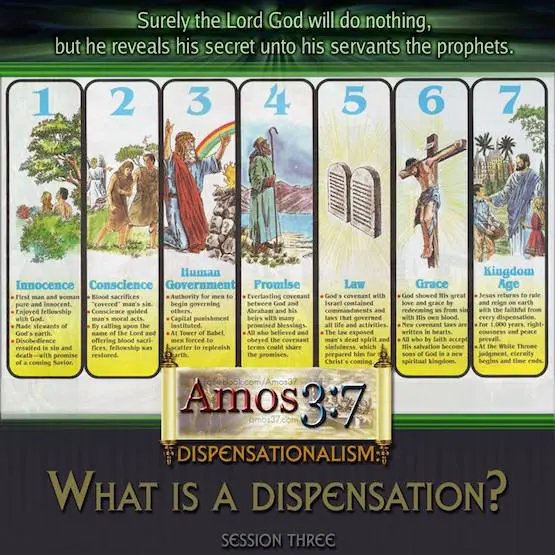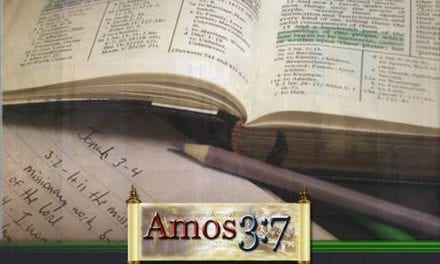 An English word dispensation is an Anglicized form of the Latin dispensatio, which the Vulgate uses to translate the Greek word. The Latin verb is a compound, meaning “to weigh out or dispense.”[7] Three principal ideas are connected to the meaning of the English word: (1) “The action of dealing out or distributing”; (2) “the action of administering, ordering, or managing; the system by which things are administered”; and (3) “the action of dispensing with some requirement.”[8] In further defining the use of the word theologically, the same dictionary says that a dispensation is “a stage in a progressive revelation, expressly adapted to the needs of a particular nation or period of time… By Dr. Charles C. Ryrie
An English word dispensation is an Anglicized form of the Latin dispensatio, which the Vulgate uses to translate the Greek word. The Latin verb is a compound, meaning “to weigh out or dispense.”[7] Three principal ideas are connected to the meaning of the English word: (1) “The action of dealing out or distributing”; (2) “the action of administering, ordering, or managing; the system by which things are administered”; and (3) “the action of dispensing with some requirement.”[8] In further defining the use of the word theologically, the same dictionary says that a dispensation is “a stage in a progressive revelation, expressly adapted to the needs of a particular nation or period of time… By Dr. Charles C. Ryrie
From Chapter 2 Dispensationalism Dr. Charles C. Ryrie
What Is a Dispensation?
There is no more primary problem in the whole matter of dispensationalism than that of definition. By this is meant not simply arriving at a single sentence definition of the word but also formulating a definition/description of the concept. This will require an examination of the scriptural use of the word, a comparison of the word dispensation with related words such as age, a study of the use of the word in church history and some observations concerning the characteristics and number of the dispensations.
To say that there is a great lack of clear thinking on this matter of definition is an understatement. Both dispensationalists and nondispensationalists are often guilty of lack of clarity. Many from both groups are satisfied to use the well-known definition that appears in the notes of the original Scofield Reference Bible: “A dispensation is a period of time during which man is tested in respect of obedience to some specific revelation of the will of God. Seven such dispensations are distinguished in Scripture.”[1] Dispensationalists use this definition without thinking further of its implications in relation to age, for instance, and without ever examining its basis or lack of basis in the scriptural revelation itself. Nondispensationalists use it as a convenient and useful scapegoat simply because it does not (and could not in two sentences) convey all that is involved in the concept of a dispensation. If this concise definition were all that Scofield had to say about dispensations, then it would be fair to concentrate an attack on it, but if he has more to say (which he does) then it is not.
The New Scofield Bible, though beginning the note on dispensations with the same sentence as the original Scofield, continues with four paragraphs of elaboration. Among other matters, those added paragraphs focus on the concepts of (1) a deposit of divine revelation, (2) man’s stewardship responsibility to that revelation, and (3) the time period during which a dispensation operates. Also, it is made quite clear that dispensations are not separate ways of salvation; rather, there is only one way of salvation — “by God’s grace through the work of Christ… on the cross.”[2] More recent nondispensationalists seem to prefer not to interact with this expanded definition/description in their discussions about dispensationalism.[3]
To draw an analogy in another doctrinal area, a conservative, when pressed for a concise statement of his theory of the Atonement will answer, “I believe in substitutionary atonement.” This is entirely accurate and probably the best concise answer that could be given. But liberals are well known for using this simple statement as a means of ridicule, for they point out that the work of Christ cannot be confined to a single aspect like substitution. That is true, and the conservative recognizes that the entire work of Christ cannot be fully expressed by the single word substitution. Nevertheless, all the work of Christ is based on His vicarious sacrifice.
In like manner, the nondispensationalist points out some lack in the old Scofield definition and with a wave of the hand dismisses dispensationalism on the basis of the weakness of the definition! Perhaps the earlier definition does not distinguish dispensation from age, but such failure does not mean that they cannot be distinguished or that they have not been distinguished by others. And it certainly does not mean that the entire system is condemned. John Wick Bowman resorts to this stratagem when he declares, “The word translated ‘dispensation’ in the Greek Bible… never means nor does it ever have any reference to a period of time as such, as Scofield’s definition demands.”[4] Though the accuracy of Bowman’s statement may be questioned by the references in Ephesians 1:10 and 3:9, in making such a charge against Scofield’s definition, Bowman attempts to discredit the entire system.
The popularity of the Scofield Reference Bible has focused considerable attention on the definition in its notes and has made it a prime target for attack by nondispensationalists. However, scholars who are critical of dispensationalism should recognize that Scofield is not the only one who has defined the word, and, if there are lacks in his definition, they ought to recognize that his revisers and others have offered definitions that are more expanded. At any rate, any scholarly critique should certainly take into account several definitions if the system is to be represented fairly, For instance, L. S. Chafer did not emphasize the time aspect of a dispensation in his concept,[5] and long ago the present writer defined a dispensation entirely in terms of economy rather than age.[6] Any critique ought to take into account such definitions as well as Scofield’s.
THE ETYMOLOGY OF THE WORD DISPENSATION
The English word dispensation is an Anglicized form of the Latin dispensatio, which the Vulgate uses to translate the Greek word. The Latin verb is a compound, meaning “to weigh out or dispense.”[7] Three principal ideas are connected to the meaning of the English word: (1) “The action of dealing out or distributing”; (2) “the action of administering, ordering, or managing; the system by which things are administered”; and (3) “the action of dispensing with some requirement.”[8] In further defining the use of the word theologically, the same dictionary says that a dispensation is “a stage in a progressive revelation, expressly adapted to the needs of a particular nation or period of time… Also, the age or period during which a system has prevailed.”[9] It is interesting to notice, in view of the usual criticism of Scofield’s definition, that in this dictionary definition dispensation and age are closely related.
The Greek word oikonomia comes from the verb that means to manage, regulate, administer, and plan.[10] The word itself is a compound whose parts mean literally “to divide, apportion, administer or manage the affairs of an inhabited house.” In the papyri the officer (oikonomos) who administered a dispensation was referred to as a steward or manager of an estate, or as a treasurer.[11] Thus, the central idea in the word dispensation is that of managing or administering the affairs of a household.
SCRIPTURAL USE OF THE WORD DISPENSATION
The Usage of the Word
The various forms of the word dispensation appear in the New Testament twenty times. The verb oikonomeo is used once in Luke 16:2, where it is translated “to be a steward.” The noun oikonomos appears ten times (Luke 12:42; 16:1, 3, 8; Rom. 16:23; 1 Cor. 4:1, 2; Gal. 4:2; Titus 1:7; 1 Peter 4:10) and is usually translated “steward” or “manager” (but “treasurer” in Rom. 16:23). The noun oikonomia is used nine times (Luke 16:2, 3, 4; 1 Cor. 9:17; Eph. 1:10; 3:2, 9; Col. 1:25; 1 Tim. 1:4). In these instances, it is translated variously (“stewardship,” “dispensation,” “administration,” “job,” “commission”).
The Features Displayed
Before attempting any formal definition, it might be useful to note some of the features connected with the word itself as it appears in the New Testament. These are not necessarily features of the dispensational scheme but are simply observable connections in which the word is used. In Christ’s teaching, the word is confined to two parables recorded in Luke (12:42; 16:1,3,8). In both cases, the parables concern the management of a household by a steward or manager, but the parable recorded in Luke 16 gives some important characteristics of a stewardship, or dispensational, arrangement. These characteristics include the following:
- Basically, there are two parties: the one whose authority it is to delegate duties, and the one whose responsibility it is to carry out these charges. The rich man and the steward (or manager) play these roles in the parable of Luke 16 (v. 1).
- There are specific responsibilities. In the parable the steward failed in his known duties when he wasted the goods of his lord (v 1).
- Accountability, as well as responsibility, is part of the arrangement. A steward may be called to account for the discharge of his stewardship at any time, for it is the owner’s or master’s prerogative to expect faithful obedience to the duties entrusted to the steward (v 2).
- A change may be made at any time unfaithfulness is found in the existing administration (“can no longer be steward”).
These four features give some idea of what was involved in the concept of a dispensational arrangement as the word was used in the time of Christ.
The other occurrences of the word are all in the writings of Paul except for the reference in 1 Peter 4:10. Certain features of the concept are evident from these usages.
- God is the one to whom men are responsible in the discharge of their stewardship obligations. In three instances this relationship to God is mentioned by Paul (1 Cor. 4:1 — 2; Titus 1:7).
- Faithfulness is required of those to whom a dispensational responsibility is committed (1 Cor. 4:2). This is illustrated by Erastus, who held the important position of treasurer (steward) of the city (Rom. 16:23).
- A stewardship may end at an appointed time (Gal. 4:2). In this reference, the end of the stewardship came because of a different purpose being introduced. This reference also shows that a dispensation is connected with time.
- Dispensations are connected with the mysteries of God, that is, with specific revelation from God (1 Cor. 4:1; Eph. 3:2; Col. 1:25).
- Dispensation and age are connected ideas, but the words are not exactly interchangeable. For instance, Paul declares that the revelation of the present dispensation was hidden “for ages,” meaning simply a long period of time (Eph. 3:9). The same thing is said in Colossians 1:26. However, since a dispensation operates within a time period, the concepts are related.
- At least three dispensations (as commonly understood in dispensational teaching) are mentioned by Paul. In Ephesians 1:10 he writes of “an administration [dispensation, KJV] suitable to the fullness of the times,” which is a future period. In Ephesians 3:2 he designates the “stewardship [dispensation, KJV] of God’s grace, which was the emphasis of the content of his preaching at that time. In Colossians 1:25 — 26 it is implied that another dispensation preceded the present one, in which the mystery of Christ in the believer is revealed.
It is important to notice that in the first two of these instances there can be no question that the Bible uses the word dispensation in exactly the same way the dispensationalist does. Even Bowman admits that: “Actually, of all seven dispensations accepted by Scofield and his colleagues, there are but two (Grace and the Fullness of Time) in connection with which the word ‘dispensation’ is ever used at all.”[12] The negative cast of Bowman’s statement must not obscure the importance of this point. The Bible does name two dispensations in the same way that dispensationalists do (and implies a third). Granted, it does not name seven, but, since it does name two, perhaps there is something to this teaching called dispensationalism.
Almost all opponents of dispensationalism try to make much of their claim that the Scriptures do not use the word dispensation in the same theological and technical sense that the dispensational scheme of teaching does. Two facts should be pointed out in answer to this charge. The first has already been stated in the preceding paragraph: Scripture on at least two occasions does use the word in the same way the dispensationalist does. Thus, the charge is simply not true.
Second, it is perfectly valid to take a biblical word and use it in a theological sense as long as the theological use is not unbiblical. All conservatives do this with the word atonement. It is a word that is never used in the New Testament, yet theologically all use it to stand for what is involved in the death of Christ. Biblically, the word atonement is not used in connection with the death of Christ, but, since it is used for the covering for sin in the Old Testament, it is not unbiblical to give it a theological meaning that is, in reality, more inclusive than its strict biblical usage. The dispensationalist does a similar thing with the word dispensation. The usage of the word and the features of the word, as outlined above, prove conclusively that the dispensationalist has in no way used the word in an unbiblical sense when he uses it as a designation for his system of teaching. Even Daniel Fuller admits this: “It is this latter sense which gives rise to the perfectly valid theological usage of the word ‘dispensation’ to denote a period of time during which God deals with man in a certain way.”[13]
Definitions
As far as the use of the word in Scripture is concerned, a dispensation may be defined as a stewardship, administration, oversight, or management of others’ property. As we have seen, this involves responsibility, accountability, and faithfulness on the part of the steward.
The theological definition of the word is based on the biblical usage and characteristics. Scofield’s definition has been quoted: “A dispensation is a period of time during which man is tested in respect of obedience to some specific revelation of the will of God.” As has been seen, the usual criticism leveled against this definition is that it is not true to the meaning of oikonomia since it says nothing about a stewardship but emphasizes the period of time aspect. Yet note that Fuller admits the validity of practically the same definition, namely that the word may be used “to denote a period of time during which God deals with man in a certain way “[14] However, there is a certain justification to the criticism, for a dispensation is primarily a stewardship arrangement and not a period of time (though obviously, the arrangement will exist during a period of time). Age and dispensation are not synonymous in meaning, even though they may exactly coincide in the historical outworking. A dispensation is basically the arrangement involved, not the time involved; and a proper definition will take this into account. However, there is no reason for great alarm if a definition does ascribe time to a dispensation.
A concise definition of a dispensation is this: A dispensation is a distinguishable economy in the outworking of God’s purpose. If one were describing a dispensation, he would include other things, such as the ideas of distinctive revelation, responsibility, testing, failure, and judgment. But at this point, we are seeking a definition, not a description. In using the word economy as the core of the definition, the emphasis is put on the biblical meaning of the word itself. The Economy also suggests that certain features of different dispensations might be the same or similar. Differing political and economic economies are not completely different, yet they are distinguishably different. Communistic and capitalistic economies are basically different, and yet there are functions, features, and items in these opposing economies that are the same. Likewise, in the different economies of God’s running the affairs of this world certain features are similar. However, the word distinguishable in the definition points out that some features are distinctive to each dispensation and mark them off from each other as different dispensations. These are contained in the particular revelation distinctive to each dispensation.
The phrase “the outworking of God’s purpose” in the definition reminds us that the viewpoint in distinguishing the dispensations is God’s, not man’s. The dispensations are economies instituted and brought to their purposeful conclusion by God. The distinguishing features are introduced by God; the similar features are retained by God, and the overall combined purpose of the whole program is the glory of God. Erich Sauer states it this way:
A new period always begins only when from the side of God a change is introduced in the composition of the principles valid up to that time; that is, when from the side of God three things concur:
1. A continuance of certain ordinances valid until then;
2. An annulment of other regulations until then valid;
3. A fresh introduction to new principles not before valid.[15]
To summarize: Dispensationalism views the world as a household run by God. In His household world, God is dispensing or administering its affairs according to His own will and in various stages of revelation in the passage of time. These various stages mark off the distinguishably different economies in the outworking of His total purpose, and these different economies constitute the dispensations. The understanding of God’s differing economies is essential to a proper interpretation of His revelation within those various economies.
Before leaving the subject of definitions, it may be helpful to append several other useful definitions of a dispensation. W Graham Scroggie, a noted Scottish writer and pastor, gave this helpful definition:
The word oikonomia bears one significance and means “an administration,” whether of a house, or property of a state, or a nation, or as in the present study the administration of the human race or any part of it , at any given time. Just as a parent would govern his household in different ways, according to varying necessity yet ever for one good end, so God has at different times dealt with men in different ways, according to the necessity of the case, but throughout for one great, grand end.[16]
Harry Ironside, prince of dispensational preachers, defined it this way: “An economy is an ordered condition of things… There are various economies running through the Word of God. A dispensation, an economy then, is that particular order or condition of things prevailing in one special age which does not necessarily prevail in another.”[17]
Clarence E. Mason, Jr., dean for many years at Philadelphia College of Bible, includes descriptive features of dispensations in his definition:
The word dispensation means literally a stewardship or administration or economy. Therefore, in its Biblical usage, a dispensation is a divinely established stewardship of a particular revelation of God’s mind and will which brings added responsibility to the whole race of men or that portion of the race to whom the revelation is particularly given by God.
Associated with the revelation, on the one hand, are promises of reward or blessing for those responding to the obedience of faith, while on the other hand there are warnings of judgment upon those who do not respond in the obedience of faith to that particular revelation.
However, though the time period (age) ends, certain principles of the revelation ( dispensation or stewardship) are often carried over into succeeding ages, because God’s truth does not cease to be truth, and these principles become part of the cumulative body of truth for which man is responsible in the progressive unfolding revelation of God’s redemptive purpose.[18]
Another definition also includes descriptive elements:
A dispensation is God’s distinctive method of governing mankind or a group of men during a period of human history, marked by a crucial event, test, failure, and judgment. From the divine standpoint, it is a stewardship, a rule of life, or a responsibility for managing God’s affairs in His house. From the historical standpoint, it is a stage in the progress of revelation.[19]
The differentiation of viewpoints in this definition is a helpful distinction. A dispensation is from God’s viewpoint an economy; from man’s, a responsibility; and in relation to progressive revelation, a stage in it.
The more recent movement that calls itself progressive dispensationalism includes some important differences from normative dispensationalIsm. Though its adherents do not wish to be restricted by a sine qua non , they acknowledge the straightforward meaning of the word; namely, “The word dispensation refers to a particular arrangement by which God regulates the way human beings relate to Him.”[20] However, they distance themselves from classic dispensationalists by describing themselves as understanding “the dispensations not simply as different arrangements between God and humankind, but as successive arrangements in the progressive revelation and accomplishment of redemption.”[21] These differences will be discussed in chapter 9.
THE RELATION OF THE DISPENSATIONS TO PROGRESSIVE REVELATION
Progressive revelation is the recognition that God’s message to man was not given in one single act but was unfolded in a series of successive acts and through the minds and hands of many men of varying backgrounds. It is, so to speak, a theistic view of revelation rather than a deistic view. The pages of the Bible present “not the exposition of a revelation completed, but the records of a revelation in progress. Its parts and features are seen, not as arranged after their development, but as arranging themselves in the course of their development, and growing, through stages which can be marked, and by accessions which can be measured, into the perfect form which they attain at last.”[22]
The principle of progressive revelation is evident in the Scriptures themselves. Paul told his audience on Mars Hill that in a former day God overlooked their ignorance, but now He commands repentance (Acts 17:30). The majestic opening of the book of Hebrews emphatically outlines the various means of progressive revelation (Heb. 1:1 — 2). One of the most striking verses that shows the different ways of God’s dealing with mankind is John 1:17: “For the Law was given through Moses; grace and truth were realized through Jesus Christ.” Other examples may be found in John 14:16 — 17; 14:26; and 16:24. God’s truth was obviously not given all at one time, and the varying stages of revelation show that He has worked in different ways at different times. The Bible interpreter must observe carefully this progressiveness of revelation, and dispensationalism helps promote accuracy in this regard.
In this matter of the correct observation and interpretation of the progress of revelation we see the close connection between dispensationalism and hermeneutics. A standard text on hermeneutics, which first appeared in 1883 and which has no dispensational ax to grind, says, “With each new series of generations some new promise is given, or some great purpose of God is brought to light.”[25] It is the marking off of these stages in the revelation of the purpose of God that is the basis for the dispensational approach to the interpretation of the Scriptures. Even Bernard Ramm, who later moved from a dispensational position, admitted that a clearer realization of progressive revelation has been largely due to the “beneficial influence of dispensationalism.”[24]
Nondispensational interpreters (of the covenant theology school) have been guilty of reading back (and sometimes forcing) the teaching of the New Testament into the Old, especially in an effort to substantiate their doctrine of salvation in the Old Testament. Dispensationalists, on the other hand, sometimes make such hard and fast distinctions between the ages and characteristics of the various dispensations that they, for instance, have said very little about grace in the Old Testament. However, the covenant theologian’s faulty interpretation is a result of a basically inherent defect in his system (because he subsumes everything since the Fall under the one covenant of grace), whereas the dispensationalist’s lack is not in the system but in the expounding of it. Covenant theology allows for and even demands this reading back of the New Testament into the Old. Dispensational theology, while recognizing definite and distinguishable distinctions, asserts the basic unity of the unfolding plan of God in the Scriptures.
Nevertheless, dispensationalists have not always asserted this unity as they might have, and therefore it has become a common thing to indict dispensationalism on this matter. “Dispensationalism destroys the unity of the Bible” is the cry Because of the dispensational scheme, one writer declares, “The Bible ceases to be a selfconsistent whole.”[25] “This theory,” charges Louis Berkhof, “is also divisive in tendency dismembering the organism of Scripture with disastrous results.”[26] More popularly this objection is expressed by the charge that dispensationalists see no value in the Sermon on the Mount or that they will not pray the Lord’s prayer.[27]
An interesting historical fact: In the second edition of the Scofield Reference Bible (1917, and retained in the New Scofield , 1967) a new section entitled “A Panoramic View of the Bible” was added to “show the unity of the Book,” which listed seven marks of this unity.
Even though dispensationalists may not have clearly communicated the teachings of their system along these lines, it must be remembered that the system is not at fault. Dispensationalism alone has a broad enough unifying principle to do justice to the unity of the progress of revelation on the one hand and the distinctiveness of the various stages in that progress on the other. Covenant theology can only emphasize the unity and, in so doing, overemphasizes it until it becomes the sole governing category of interpretation. Any seeming disunity in the dispensational scheme is superficial, and in reality one feels that the much publicized supposed conflicts of dispensationalism exist in the minds of the covenant theologians and are aggravated by their own unwarranted and forced unified approach to the Scriptures. Variety can be an essential part of unity . That is true of God’s creation; it is also true of God’s revelation; and only dispensationalism can adequately account for the variety of distinguishable economies or dispensations in (not apart from) the outworking of God’s purpose.
To summarize: Progressive revelation views the Bible not as a textbook on theology but as the continually unfolding revelation of God given by various means throughout the successive ages. In this unfolding there are distinguishable stages of revelation when God introduces new things for which man becomes responsible. These stages are the economies, stewardships, or dispensations in the unfolding of His purpose. Dispensationalism, therefore, recognizes both the unity of His purpose and the diversity in the unfolding of it. Covenant theology emphasizes the unity to the point of forcing unwarranted, inconsistent, and contradictory interpretations of the Scriptures. Only dispensationalism can maintain unity and diversity at the same time and offer a consistent system of interpretation
CHARACTERISTICS OF A DISPENSATION
Primary Characteristics
What marks off the various economies in the outworking of God’s purpose and distinguishes each from the other? The answer is twofold: (1) the different governing relationship with the world into which God enters in each economy; and (2) the resulting responsibility on mankind in each of these different relationships.
These characteristics are vitally bound up with the different revelations God gave throughout history and show again the link between each dispensation and the various stages in the progress of revelation. Without meaning at all to prejudge the question of how many dispensations there are, let us see if this answer is valid, using several unquestioned dispensations as illustrations.
Before sin entered at the fall of man, God’s governmental relationship with Adam and Eve was direct. Their responsibility was to maintain that direct fellowship with Him, and this involved specifically caring for the garden and abstaining from eating the fruit of the tree of the knowledge of good and evil. After sin entered at the Fall, God’s relationship was no longer always direct, for a barrier had come between Him and man.
At the giving of the law to the Israelites through Moses, God’s government was mediated through the various categories of the law This does not mean that He never spoke directly but it does mean that His principal mode of government was the Mosaic code, which was a new thing Introduced at that time. It also means that the responsibility upon mankind was conformity to that code — again a new responsibility, for prior to the giving of the law people were obviously not held responsible for something that did not exist.
After the coming of Christ, God’s governing relationship with mankind was no longer through the Mosaic Law. The rent veil and the end of approach to God through the sacrificial system show this. Witness, too, the distinguishable difference in relation to justification as summarized by Paul in his sermon at Antioch in Pisidia: “Through Him everyone who believes is freed [justified] from all things, from which you could not be freed [justified] through the Law of Moses” (Acts 13:39). Here is unquestionably a distinguishable and different way of running the affairs of the world regarding man’s responsibility in relation to the most important area of justification. Whatever his responsibility was under the Mosaic Law may be left unspecified at present (see chapter 6), but with the coming of Christ the requirement for justification became faith in Him. This, too, is obviously a distinctive stage in the progress of revelation. Therefore, we conclude that a new dispensation was inaugurated, since the economy and responsibility changed and the new revelation was given.
Thus, the distinguishing characteristics of a different dispensation are three: (1) a change in God’s governmental relationship with man (though a dispensation does not have to be composed entirely of completely new features); (2) a resultant change in man’s responsibility; and (3) corresponding revelation necessary to effect the change (which is new and is a stage in the progress of revelation through the Bible).
Secondary Characteristics
Thus far nothing has been said about the usual characteristics listed for a new dispensation: namely, a test, a failure, and a judgment. The test is practically the same as the human responsibility. Obviously, whenever God gives revelation concerning His method of running the affairs of the world, there is also given a corresponding responsibility or test to people as to whether or not they will align themselves with God’s economy and the revelation of it. Opponents of dispensationalism, who insist that such testing on God’s part makes Him little more than an experimenter apparently not knowing how things will turn out, in reality fail to understand the purpose of testing in general.[28] After all, a dispensational test is no different essentially from the tests spoken of by James in chapter 1 of his epistle. Such tests are not for the purpose of enlightening God but for the purpose of bringing out what is in people, whether faith or failure.
In one sense every dispensation contains the same test: Will a person respond favorably toward the responsibility of the particular economy under which he is living? Specifically, this general test is particularized in each dispensation by the nature of the revelation God gave in each instance concerning man’s responsibility Actually, every part of the revelation belonging to each dispensation is a part of the test, and the totality of the revelation is the test. Dispensationalists have often in their writings tried to isolate the particular test of each dispensation. Whereas this may be helpful to the student, it can only be at best a partial statement of the entire responsibility.[29]
Is failure a necessary part of each dispensation? It is a fact of biblical history that mankind has failed throughout all the ages of time. Each dispensation is filled with failures simply because history is. The failures are in at least two realms — the realm of governmental economy and the realm of salvation. In both areas not all people have failed, but in both realms most have. Sin often seems to come to a climax at certain points in human history, and such climaxes mark the end of the various dispensations. The crucifixion of Christ was the climax of rebellion of the nation that had been given the privilege of the law and the service of God. It also marked the end of a dispensation. The present age will be climaxed by rebellion and a turning away from God in force. The millennial kingdom will be climaxed by widespread rebellion against the personal reign of Christ the king (Rev 20:7 — 9).
Does each dispensation have a judgment? Actually each may have many judgments, just as it may have many testings and failures. But if there is a climactic failure, then there is also a climactic judgment. Though the matters of testing, failure, and judgment are not the basics that mark off the dispensations, they seem to be part and parcel of them. If, however, there were no decisive test, there still could be a dispensational arrangement. If there were no climactic failure and judgment, there still could be a change in the dispensational arrangement. The presence of a test, failure, and judgment is not the sine qua non (absolute essential) of a dispensational arrangement.
Objections
Do not these characteristics seem to dissect history and compartmentalize its eras? From one viewpoint dispensationalism does appear to do so. This cross-sectional perspective of the dispensational scheme is the view usually presented in dispensational charts. Although there is nothing erroneous about it , it is not the whole story. There is also what may be called the longitudinal or spiral perspective in dispensationalism.[30] This includes the continuing principles through all dispensations that give coherency to the whole course of history. The distinctive governmental arrangement that distinguishes the various dispensations in no way conflicts with the unities of Scripture.
The longitudinal perspective, for example, emphasizes the fact that God is, has been, and will be, a God of grace. The crosssectional perspective emphasizes the administration of grace that prevails today The longitudinal perspective is that of the progress of revelation; the cross-sectional is that of any given point of time. Both perspectives are not only valid but necessary in understanding God’s revelation.
Thus, it is an unwarranted objection to say, “If… God is always gracious, then it is confusing to distinguish a particular age by a term that characterizes all ages.”[31] One might ask if God has not always been a God of law? And if so, is it wrong to delineate a period called the Law? Does not God Himself through John make these distinctions (John 1:17)? The objection is based on a false premise that Fuller reveals in this further statement: “It is impossible to think of varying degrees of grace, for God either is or is not gracious.”[32] The fact is that there are varying degrees of the revelation of God’s grace, even though when there is less revelation God Himself is not less gracious than when there is greater revelation of His grace. Otherwise, God could be construed not to be very holy and righteous and just whenever He delays or defers immediate and justifiable judgment. He simply reveals His wrath more specifically at certain times in human history than at others. But periods of silence do not make Him less righteous any more than a veiled revelation of grace makes Him less gracious. Only dispensationalism with its cross-sectional and longitudinal/spiral perspectives can recognize the wealth, mobility, and complexity of the history of God’s running the affairs of this world.
Before either the covenant or dispensational systems had been developed, Calvin wrote these appropriate words:
It is not fitting, they say, that God, always self-consistent, should permit such a great change, disapproving afterward what he had once commanded and commended. I reply that God ought not to be considered changeable merely because he accommodated diverse forms to different ages, as he knew would be expedient for each. If a farmer sets certain tasks for his household in the winter, other tasks for the summer, we shall not on this account accuse him of inconstancy or think that he departs from the proper rule of agriculture, which accords with the continuous order of nature. In like manner, if a householder instructs, rules, and guides his children one way in infancy, another way in youth, and still another in young manhood, we shall not on this account call him fickle and say that he abandons his purpose. Why, then, do we brand God with the mark of inconstancy because he has with apt and fitting marks distinguished a diversity of times?[33]
Covenant theology with its all-encompassing covenant of grace glosses over great epochs and climaxes of history lest they disturb the “unity of Scripture” and introduce something so distinguishable that a dispensation might have to be recognized. Especially is this true in connection with the church as a new entity. The crosssectional view emphasizes the distinctive importance of each event in its historical setting and for its particular purpose; the longitudinal view places all events in their proper relationship in the total progress of revelation. Dispensationalism avoids confusion and contradiction and at the same time unites all the parts into the whole.
The distinguishable yet progressive character of dispensational distinctions prohibits that they should be intermingled or confused as they are chronologically successive. But it has been alleged that these characteristics of test, failure, and judgment form a repeated cyclical pattern of history like that of the pagan Greeks. For instance, Kraus says, “The philosophy of history is essentially the Greek concept of cycles, each cycle ending in apostasy and judgment. God is not represented as working out His plan in the historical process , but as appearing intermittently, as it were, to begin a new cycle by supernatural intervention.”[34] Chapter 1 pointed out that only dispensationalism presents a properly optimistic philosophy of history. Furthermore, the charts notwithstanding, the dispensational pattern does not only form a repetitive cyclical picture but also an ascending spiral. Erich Sauer, whose books combine so ably both the cross-sectional and the longitudinal perspectives of dispensationalism, summarizes the matter in this way:
But a fresh Divine beginning is never merely a return to the old. In each reformation born out of collapse lay at the same time the seed of a life-program for the future. Revelation and development are in no case opposites but belong together. In the sphere of the Bible, as elsewhere, there is an ascent from lower to higher, from twilight to clearness.[35]
This spiral concept is readily seen by imagining the confusion of inverting the dispensational order and placing the Millennium first. Just as illogical would be the reversing of Law and Grace (or whatever names you wish to attach to that which came through Moses and that which was revealed through Christ). Dispensationalism reveals the outworking of God’s plan in the historical process in a progressive revelation of His glory. It magnifies the grace of God, for it recognizes that true progress can come only from God’s gracious intervention in human society. If there were not “cyclical” interventions, then the course of history would be only downward and entirely pessimistic.
To summarize: The principal characteristic of a dispensation is the economic arrangement and responsibility that God reveals in each dispensation. Such responsibility is a test in itself. Most men fail the test, and then judgment follows. The dispensational scheme has two perspectives: a cross-sectional aspect (which is sometimes misconstrued as cycles but which is in reality a spiral) and a longitudinal aspect (which emphasizes the unfolding progress of revelation and continuing principles throughout the ages of the dispensations).
THE SINE QUA NON OF DISPENSATIONALISM
What marks off a person as a dispensationalist? What is the sine qua non (the absolutely indispensable part) of the system? Even though certain later discussions must be anticipated in order to answer that question, it seems appropriate to give an answer at this point.
Theoretically, the sine qua non ought to lie in the recognition of the fact that God has distinguishably different economies in governing the affairs of the world. Covenant theologians hold that there are various dispensations (and even use the word) within the outworking of the covenant of grace. Charles Hodge, for instance, believed that there are four dispensations after the Fall — Adam to Abraham, Abraham to Moses, Moses to Christ, and Christ to the end.[36] Berkhof writes, as we have seen, of only two basic dispensations — the Old and the New, but within the Old he sees four periods and all of these are revelations of the covenant of grace.[37] In other words, a person can believe in dispensations, and even see them in relation to progressive revelation, without being a dispensationalist.
Is the essence of dispensationalism in the number of dispensations? No, for this is in no way a major issue in the system, as will be discussed in the next chapter. It is not that Scofield taught seven dispensations and Hodge only four that makes the former a dispensationalist and the latter not.
Perhaps the issue of premillennialism is determinative. Again the answer is negative, for there are those who are premillennial who definitely are not dispensational. The covenant premillennialist holds to the concept of the covenant of grace and the central soteriological purpose of God. He retains the idea of the millennial kingdom, though he finds little support for it in the Old Testament prophecies. The kingdom in his view is markedly different from that which is taught by dispensationalists, since it loses much of its Jewish character due to the slighting of the Old Testament promises concerning the kingdom. Many covenant premillennialists are also posttribulationalists, and that seems to be a logical accompaniment of the nondispensational approach.[38] At any rate, being a premillennialist does not necessarily make one a dispensationalist. (However, the reverse is true — being a dispensationalist makes one a premillennialist.)
What, then, is the sine qua non of dispensationalism? The answer is threefold.
1 A dispensationalist keeps Israel and the church distinct . This is stated in different ways by both friends and foes of dispensationalism. Fuller says that “the basic premise of Dispensationalism is two purposes God expressed in the formation of two peoples who maintain their distinction throughout eternity”[39] A. C. Gaebelein stated it in terms of the difference between the Jews, the Gentiles, and the church of God.[40] Chafer summarized it as follows:
The dispensationalist believes that throughout the ages God is pursuing two distinct purposes: one related to the earth with earthly people and earthly objectives involved which is Judaism; while the other is related to heaven with heavenly people and heavenly objectives involved, which is Christianity … Over against this, the partial dispensationalist, though dimly observing a few obvious distinctions, bases his interpretation on the supposition that God is doing but one thing, namely the general separation of the good from the bad, and, in spite of all the confusion this limited theory creates, contends that the earthly people merge into the heavenly people; that the earthly program must be given a spiritual interpretation or disregarded altogether.[41]
This is probably the most basic theological test of whether or not a person is a dispensationalist, and it is undoubtedly the most practical and conclusive. The one who fails to distinguish Israel and the church consistently will inevitably not hold to dispensational distinctions; and one who does will.[42]
Though God’s purpose for Israel and God’s purpose for the church receive the most attention in Scripture, God has purposes for other groups as well. He has a purpose and plan for the angels, which in no way mixes with His purposes for Israel or the church (2 Peter 2:4; Rev. 4:11). He has a purpose for those who reject Him, which also is distinct from other purposes (Prov. 16:4). He has a plan for the nations, which continues into the New Jerusalem (Rev. 22:2), and those nations are distinct from the bride of Christ. God has more than two purposes even though He reveals more about His purposes for Israel and His purpose for the church than He does about the other groups.
Progressive dispensationalists seem to be blurring this distinction by saying that the concept is not in the same class as what is conveyed by the concepts of Gentiles, Israel, and Jews. What this means is not completely clear. (See the more complete discussion in chapter 9.) However, it does seem to imply that the classic Israel/church distinction is less clear.
2 This distinction between Israel and the church is born out of a system of hermeneutics that is usually called literal interpretation. Therefore, the second aspect of the sine qua non of dispensationalism is the matter of historical-grammatical hermeneutics. The word literal is perhaps not as good as either the word normal or plain, but in any case it is interpretation that does not spiritualize or allegorize as nondispensational interpretation often does. The spiritualizing may be practiced to a lesser or greater degree, but its presence in a system of interpretation is indicative of a nondispensational approach.[43]
Consistently literal, or plain, interpretation indicates a dispensational approach to the interpretation of Scripture. And it is this very consistency — the strength of dispensational interpretation — that seems to irk the nondispensationalist and becomes the object of his ridicule.[44] To be sure, literal/historical/grammatical interpretation is not the sole possession or practice of dispensationalists, but the consistent use of it in all areas of biblical interpretation is.. This does not preclude or exclude correct understanding of types, illustrations, apocalypses, and other genres within the basic framework of literal interpretation.
3 A third aspect of the sine qua non of dispensationalism is a rather technical matter that will be discussed more fully later (see chapter 5). It concerns the underlying purpose of God in the world . The covenant theologian, in practice, believes this purpose to be salvation (although covenant theologians strongly emphasize the glory of God in their theology), and the dispensationalist says the purpose is broader than that; namely the glory of God . Progressives have a Christological center, apparently to undergird their emphasis on the Davidic covenant and on Christ as the already reigning Davidic ruler in heaven.
To the normative dispensationalist, the soteriological, or saving, program of God is not the only program but one of the means God is using in the total program of glorifying Himself. Scripture is not man-centered as though salvation were the main theme, but it is God-centered because His glory is the center. The Bible itself clearly teaches that salvation, important and wonderful as it is, is not an end in itself but is rather a means to the end of glorifying God (Eph.. 1:6, 12, 14). John F. Walvoord, Chafer’s successor at Dallas Theological Seminary, puts it this way: “The larger purpose of God is the manifestation of His own glory To this end each dispensation, each successive revelation of God’s plan for the ages, His dealing with the non-elect as with the elect . . . combine to manifest divine glory.”[45] In another place he says:
All the events of the created world are designed to manifest the glory of God. The error of covenant theologians is that they combine all the many facets of divine purpose in the one objective of the fulfillment of the covenant of grace. From a logical standpoint, this is the reductive error — the use of one aspect of the whole as the determining element.[46]
The essence of dispensationalism, then, is the distinction between Israel and the church. This grows out of the dispensationalist’s consistent employment of normal or plain or historical-grammatical interpretation, and it reflects an understanding of the basic purpose of God in all His dealings with mankind as that of glorifying Himself through salvation and other purposes as well.
Connect with Amos37
Stay up to date with Amos37.com eMail update (Weekly)
NOTES
[1] Scofield Reference Bible (New York: Oxford, 1909), 5.
[2] New Scofield Reference Bible (New York: Oxford, 1967), 3.
[3] E.g., John H. Gerstner, Wrongly Dividing the Word of Truth Brentwood , Tenn. : Wolgemuth & Hyatt, 1991), 152, 270.
[4] John Wick Bowman, “The Bible and Modem Religions: II. Dispensationalism,” Interpretation 10 (April 1956): 174.
[5] L. S. Chafer, Dispensationalism (Dallas: Seminary Press, 1936), 8 — 9.
[6] Charles C. Ryrie, “The Necessity of Dispensationalism,” Bibliotheca Sacra 114 (July 1957): 251.
[7] W W Skeat, An Etymological Dictionary of the English Language (Oxford: Clarendon, 1946), 174.
[8]Oxford English Dictionary (New York: Oxford Univ. Press, 1933), 3:481.
[9] Ibid.
[10] W F. Arndt and F. W Gingrich , A Greek-English Lexicon of the New Testament (Chicago: Univ. of Chicago Press, 1957), 562.
[11] J. H. Moulton and George Milligan, The Vocabulary of the Greek Testament (Grand Rapids: Eerdmans, 1949), 442 — 43.
[12] Bowman, “The Bible and Modern Religions: II. Dispensationalism, 175.
[13] Daniel P Fuller, “The Hermeneutics of Dispensationalism (Th.D. diss., Northern Baptist Theological Seminary, Chicago, 1957), 20.
[14] Ibid.
[15] Erich Sauer, The Dawn of World Redemption (Grand Rapids: Eerdmans, 1951), 194.
[16] W Graham Scroggie, Ruling Lines of Progressive Revelation (London:
Morgan & Scott, 1918), 62 — 63.
[17] H. A. Ironside, In the Heavenlies ( New York : Loizeaux Bros., n.d.), 67.
[18] C. E. Mason, Jr., “Eschatology” (mimeographed notes for course at Philadelphia College of Bible, rev. 1962), 5 — 6.
[19] Paul David Nevin, “Some Major Problems in Dispensational Interpretation” (unpublished Th.D. diss., Dallas Theological Seminary 1963), 97.
[20] Craig A. Blaising and Darrell L. Bock, Progressive Dispensationalism (Wheaton, Ill.: Victor, 1993), 14.
[21] Ibid., 48.
[22] T D. Bernard, The Progress of Doctrine in the New Testament ( Grand Rapids : Zondervan, n.d.), 20.
[23] Milton S. Terry, Biblical Hermeneutics ( Grand Rapids : Zondervan, nd.), 568.
[24] Bernard Ramm, Protestant Biblical Interpretation , rev. ed. (Boston: Wilde,
1956), 158.
[25] Oswald T Allis, “Modern Dispensationalism and the Law of God,” Evangelical Quarterly 8(15 July 1936): 272.
[26] Louis Berkhof, Systematic Theology (Grand Rapids: Eerdmans, 1941), 291.
[27] For example, T A. Hegre, The Cross and Sanctification (Minneapolis: Bethany Fellowship, 1960), 6. Cf. the entire chapter entitled “Have You Lost Your Bible?” which devotes two pages to the disastrous effects of liberalism on the Bible and five pages to the “damaging” results of dispensationalism!
[28] Bowman, “The Bible and Modern Religions: II. Dispensationalism, 176.
[29] C. l. Scofield, Rightly Dividing the Word of Truth (New York : Revell, nd.).
[30] H. Chester Woodring, “Grace Under the Mosaic Covenant” (unpublished Th.D. diss., Dallas Theological Seminary 1956), 33 — 38.
[31] Fuller, “The Hermeneutics of Dispensationalism, 164.
[32] Ibid.
[33] John Calvin, Institutes of the Christian Religion ( London : Wolfe & Harison, 1561), II, XI, 13.
[34] C. Norman Kraus, Dispensationalism in America (Richmond: John Knox, 1958), 126.
[35] Sauer, The Dawn of World Redemption , 54
[36] Charles Hodge, Systematic Theology (Grand Rapids: Eerdmans, 1946), 2:373-77.
[37] Berkhof, Systematic Theology , 293-300.
[38] H. Phillip Hook, “The Doctrine of the Kingdom in Covenant Premillennialism (unpublished Th.D. diss., Dallas Theological Seminary 1959). Cf. Fuller, “The Hermeneutics of Dispensationalism, 363-64.
[39] Fuller, “The Hermeneutics of Dispensationalism, 25.
[40] Arno C. Gaebelein, The Gospel of Matthew (New York: Our Hope, 1910), 1:4.
[41] Chafer, Dispensationalism, 107.
[42] There can be rare exceptions, as with C. E. B. Cranfield ( Commentary on Romans [Edinburgh: T & T Clark, 1979], 448 n. 2), who rejects the teaching that Israel has been replaced by the church.
[43] Cf. George E. Ladd, The Blessed Hope (Grand Rapids: Eerdmans, 1956),
126 — 34. Even though Ladd believes in a future for the nation Israel (cf. “Is There a Future for Israel?” Eternity [May 1964], 25 — 28, 36), that does not mean that he is a dispensationalist, for he fails to meet the criterion concerning the consistent use of the literal principle of interpretation. In this same article (p. 27) he declares that “although the Church is spiritual Israel, the New Testament teaches that literal Israel is yet to be saved.” In other words, he distinguishes the church and Israel in the future millennial age, but he does not distinguish them in the present age. Since Israel and the church are not kept distinct throughout God’s program, Ladd fails to meet this test of dispensationalism.
[44] Arnold B. Rhodes, ed., The Church Faces the Isms (New York: Abingdon, 1958), 95.
[45] John F. Walvoord, “Review of Crucial Questions About the Kingdom of God, by George E. [add,” Bibliotheca Sacra 110 (January 1953): 3-4.
[46] John F. Walvoord, The Millennial Kingdom (Findlay, Ohio: Dunham, 1959), 92.
Dispensationalism. Charles C. Ryrie. Moody Press, Chicago. 1995. Pages 23-43
Blue Letter Bible – Study Tools
“DISPENSATIONAL TRUTH” or “GOD’S PLAN AND PURPOSE IN THE AGES”
- 1. The Prophetic Word
- 2. Pre‐Millennalism
- 3. Mountain Peaks Of Prophecy
- 4. The Second Coming of Christ
- 5. Rightly Dividing the Word
- 6. The Present Evil World
- 7. The Dispensational Work of Christ
- 8. The Dispensational Work of the Holy Spirit
- 9. The Jews
- 10. The Gentiles
- 11. The Church
- 12. The King
- 13. The Kingdom
- 14. The Spirit Word
- 15. Spiritualism
- 16. The Resurrections
- 17. The Judgments
- 18. Satan
- 19. Antichrist
- 20. The Satanic Trinity
- 21. The Four Gospels
- 22. The Seven Churches
- 23. The Tribulation
- 24. Babylon the Great
- 25. Renovation of the Earth
- 26. The Covenants
- 27. The Mysteries
- 28. Types And Antitypes
- 29. The Trees to Which Israel Is Compared In Scriptures
- 30. The Feasts of the Lord
- 31. The Offerings
- 32. The Dispensational Teaching of the Great Pyramid
- 33. Scripture Numerics
- 34. The Signs of the Times
- “He Shall Come”
- • 1. The Ages as Viewed From Different Standpoints
- 2. The Mountain Peaks of Prophecy
- 3. The Perspective of Prophecy
- 4. The Two Comings
- 5. The Two Stages of the Coming
- 6. Time Element of the Comings
- 7. 7000 Years of Human History
- 8. Rightly Dividing the Word
- 9. Relation of Jew, Gentile And Church to Each Other
- 10. The Times And Seasons
- 11. The Creation of the Earth
- 12. Generation
- 13. Six Days of Re‐Creation
- 14. First Day (Cosmic Light)
- 15. Second Day (Firmament Formed)
- 16. Third Day (Land And Vegetation)
- 17. Fourth Day (Solar Light Restored)
- 18. Fifth Day (Fish And Fowl)
- 19. Sixth Day (Animals And Man)
- 20. Diagram of the Eight Works of the Six Days
- 21. The Seven Cosmic Phases of the Earth
- 22. Degeneration
- 23. Edenic Dispensation
- 24. Book of Genesis
- 25. Antediluvian Dispensation
- 26. Post‐Diluvian Dispensation
- 27. Patriarchal Dispensation
- 28. Legal Dispensation
- 29. Ecclesiastical
- 30. The Tribulation
- 31. Dispensation of Judgment
- 32. Regeneration
- 33. Messianic Dispensation
- 34. Perfect Dispensation
- 35. The World’s 7 Great Crises
- 36. The Prophetic Days of Scripture
- 37. Greater Life And Work of Christ
- 38. The Heavenly Tabernacle
- 39. The Jews
- 40. Book of Exodus
- 41. The Royal Grant to Abraham
- 42. Book of Daniel
- 43. Prophetical Chronology
- 44. Daniel’s Seventy Weeks
- 45. Map of Old Roman Empire
- 46. The Gentile Nations
- 47. The Church
- 48. Failure of Christianity
- 49. God’s Eternal Purpose as to the Earth
- 50. The King
- 51. Book of Matthew
- 52. Kingdom of God vs. Kingdom of Heaven
- 53. Kingdom
- 54. The Church vs. the Kingdom
- 55. Kingdom of Heaven Parables
- 56. The Millennial Land
- 57. Book of Ezekiel
- 58. The Spirit World
- 59. Threefold Nature of Man
- 60. The Three Tabernacles
- 61. The Resurrections
- 62. First And Second Resurrection
- 63. Resurrections And Judments
- 64. Judgment of Reward
- 65. Satan
- 66. Antichrist And Times of the Gentiles
- 67. The Four Gospels
- 68. When the New Testament Books Were Written
- 69. Book of Revelation
- 70. Messages to the 7 Churches
- 71. The 7 Churches
- 72. Messages to the 7 Churches
- 73. Daniel’s Seventieth Week
- 74. Daniel And Revelation Compared
- 75. The 3 Stages of the Earth
- 76. Renovation of the Earth
- 77. The Holy City‐New Jerusalem
- 78. The Covenants
- 79. The Mysteries
- 80. Five Fingers Pointing to Christ
- 81. Types And Antitypes
- 82. “As” And “So”
- 83. The Feasts of the Lord
- 84. The Tabernacle
- 85. Book of Leviticus
- 86. Great Pyramid (Diagram A)
- 87. Vertical Section of Great Pyramid
- 88. Christ And the Saints Compared to the Heavenly Bodies
- 89. The Weeks of Scripture
- 90. The Signs of the Times
- CUTS
- 1. The Passover
- 2. Michael And the Dragon
- 3. The White Horse Rider
- 4. Daniel’s Fourth Wild Beast
- 5. Ram and He Goat
- 6. Four Horned Ram
- 7. Paul’s Man of Sin
- 8. John’s Beast
- 9. The Scarlet Woman
- 10. The False Prophet
- 11. Image of the Beast
- 12. The Sun Clothed Woman
- 13. The Vine
- 14. The Fig‐Tree
- 15. The Olive



















